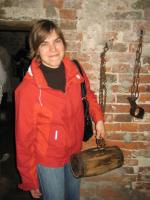Abstract
We can observe that the amount of non-toy domain ontologies is still
very limited for many areas of interest. In contrast, folksonomies are widely in
use for (1) tagging Web pages (e.g. del.icio.us), (2) annotating pictures (e.g.
flickr), or (3) classifying scholarly publications (e.g. bibsonomy). However,
such folksonominies cannot offer the expressivity of ontologies, and the
respective tags often lack a context-independent and intersubjective definition
of meaning. Also, folksonomies and other unsupervised vocabularies frequently
suffer from inconsistencies, redundancies and uncontrolled growth. In this
paper, we argue that the social interaction manifested in folksonomies and in
their usage should be exploited for building and maintaining ontologies. Then,
we sketch a comprehensive approach for deriving ontologies from
folksonomies by integrating multiple resources and techniques. In detail, we
suggest combining (1) the statistical analysis of folksonomies, associated usage
data, and their implicit social networks, (2) Web resources like Google,
Wikipedia, and the Leo dictionaries; (3) WordNet and other terminological
resources, (4) ontology mapping and matching approaches, and (5)
functionality that helps human actors in achieving and maintaining consensus
over ontology element suggestions resulting from the preceeding steps.
Links and resources
Tags
community
@boehr's tags highlighted
- ontology
- folksonomy
- tagging
- ontologies
- folksonomies
- imported
- toread
- tagging_problems
- folksontology
- tagging_convergence
- 2007
- ezweb
- folksonomy,
- ontology_learning
- ontology_problems
- tagging_efficiency
- diss
- tagging_comparison
- ontologyunderstanding
- ontologyproblems
- ontology,
- imported,
- tag_concept_mapping
- ol_web2.0
- turning
- taggingsurvey
- ol
- integrated
- approach
- 2007dissezwebfolksonomyontologyontology_problemsontologyproblemsontologyunderstandingtagging_comparisontagging_convergencetagging_efficiencytagging_problemstoread
- ontology_engineering
- folksology
- semantics






















